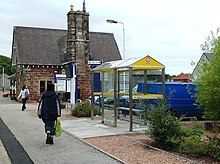Golspie railway station
 | |||||
| General information | |||||
| Location | Golspie, Highland Scotland | ||||
| Coordinates | 57°58′16″N 3°59′15″W / 57.9712°N 3.9874°W | ||||
| Grid reference | NH825997 | ||||
| Managed by | ScotRail | ||||
| Platforms | 1 | ||||
| Other information | |||||
| Station code | GOL[2] | ||||
| History | |||||
| Original company | Sutherland Railway | ||||
| Pre-grouping | Highland Railway | ||||
| Post-grouping | LMSR | ||||
| Key dates | |||||
| 13 April 1868 | Opened as terminus | ||||
| 19 June 1871 | Line extended to Helmsdale | ||||
| Passengers | |||||
| 2019/20 | |||||
| 2020/21 | |||||
| 2021/22 | |||||
| 2022/23 | |||||
| 2023/24 | |||||
Listed Building – Category B | |||||
| Designated | 7 March 1984 | ||||
| Reference no. | LB7009[3] | ||||
| |||||
Golspie railway station is a railway station serving the village of Golspie in the Highland council area of Scotland. It is on the Far North Line, situated between Rogart and Dunrobin Castle, 84 miles 30 chains (135.8 km) from Inverness.[4] ScotRail, who manage the station, operate all services.
History
[edit]It was designed with a combined post office by the architect William Fowler,[5] and opened on 13 April 1868. Originally, it was the northern terminus of the Sutherland Railway, which had been intended to continue to Brora but had run out of money after reaching Golspie. The Duke of Sutherland used his own personal finances to build the line onwards through Brora to Helmsdale, this being the Duke of Sutherland's Railway, completed on 19 June 1871.[6][7][8]
The station formerly had two platforms and a passing loop. One platform remains in use and the loop has been lifted.
The former goods yard is to the south of the station. The station hosted an LMS caravan from 1935 to 1939.[9] A camping coach was also positioned here by the Scottish Region from 1957 to 1959 and 1964, no coaches were at the station in 1960 and 1961, then a Pullman camping coach was here in 1962, 1963 and 1965 and finally two ordinary coaches were here in 1966 and 1967.[10]
Facilities
[edit]
The station has one platform, with a small car park, a waiting shelter, bike racks and a help point. As there are no facilities to purchase tickets, passengers must buy one in advance, or from the guard on the train.[11]
Passenger volume
[edit]| 2002–03 | 2004–05 | 2005–06 | 2006–07 | 2007–08 | 2008–09 | 2009–10 | 2010–11 | 2011–12 | 2012–13 | 2013–14 | 2014–15 | 2015–16 | 2016–17 | 2017–18 | 2018–19 | 2019–20 | 2020–21 | 2021–22 | 2022–23 | |
|---|---|---|---|---|---|---|---|---|---|---|---|---|---|---|---|---|---|---|---|---|
| Entries and exits | 7,032 | 7,530 | 7,429 | 6,956 | 7,587 | 9,154 | 8,486 | 8,092 | 6,852 | 7,550 | 7,788 | 6,770 | 5,192 | 5,718 | 5,786 | 6,150 | 5,586 | 576 | 4,536 | 4,056 |
The statistics cover twelve month periods that start in April.
Services
[edit]On weekdays and Saturdays, there are 4 trains each way (i.e., 4 to Inverness and 4 to Wick). On Sundays, this drops to just one in each direction.[13]
| Preceding station | Following station | |||
|---|---|---|---|---|
| Rogart | ScotRail Far North Line |
Dunrobin Castle or Brora | ||
| Historical railways | ||||
| The Mound Line open, station closed |
Highland Railway Duke of Sutherland's Railway |
Dunrobin Castle Line and station open | ||
References
[edit]- ^ Brailsford, Martyn, ed. (December 2017) [1987]. "Gaelic/English Station Index". Railway Track Diagrams 1: Scotland & Isle of Man (6th ed.). Frome: Trackmaps. ISBN 978-0-9549866-9-8.
- ^ Deaves, Phil. "Railway Codes". railwaycodes.org.uk. Retrieved 27 September 2022.
- ^ "GOLSPIE RAILWAY STATION". Historic Scotland. Retrieved 25 February 2019.
- ^ Bridge, Mike, ed. (2017). TRACKatlas of Mainland Britain: A Comprehensive Geographic Atlas Showing the Rail Network of Great Britain (3rd ed.). Sheffield: Platform 5 Publishing Ltd. p. 102. ISBN 978-1909431-26-3.
- ^ "DSA Architect Biography Report: William Fowler". Dictionary of Scottish Architects, 1660-1980.
- ^ Butt, R.V.J. (1995). The Directory of Railway Stations. Yeovil: Patrick Stephens Ltd. pp. 71–72, 106. ISBN 1-85260-508-1. R508.
- ^ Awdry, Christopher (1990). Encyclopaedia of British Railway Companies. London: Guild Publishing. p. 105. CN 8983.
- ^ Vallance, H.A.; Clinker, C.R.; Lambert, Anthony J. (1985) [1938]. The Highland Railway (4th ed.). Newton Abbot: David & Charles. pp. 35–36. ISBN 0-946537-24-0.
- ^ McRae, Andrew (1997). British Railway Camping Coach Holidays: The 1930s & British Railways (London Midland Region). Vol. Scenes from the Past: 30 (Part One). Foxline. p. 22. ISBN 1-870119-48-7.
- ^ McRae, Andrew (1998). British Railways Camping Coach Holidays: A Tour of Britain in the 1950s and 1960s. Vol. Scenes from the Past: 30 (Part Two). Foxline. p. 13. ISBN 1-870119-53-3.
- ^ "National Rail Enquiries -". www.nationalrail.co.uk. Retrieved 3 April 2022.
- ^ "Estimates of station usage | ORR Data Portal". dataportal.orr.gov.uk. Retrieved 25 December 2023.
- ^ eNRT December 2021 Edition, Table 219
External links
[edit]- Train times and station information for Golspie railway station from National Rail
- Railway stations in Highland (council area)
- Railway stations in Sutherland
- Railway stations in Great Britain opened in 1868
- Railway stations served by ScotRail
- Former Highland Railway stations
- Listed railway stations in Scotland
- Category B listed buildings in Highland (council area)
- William Fowler railway stations
- 1868 establishments in Scotland
- Golspie
- Highland railway station stubs
